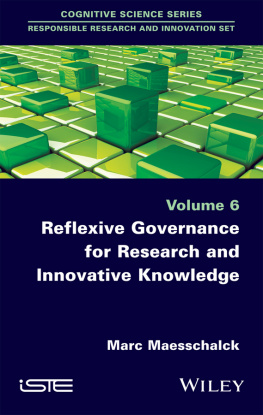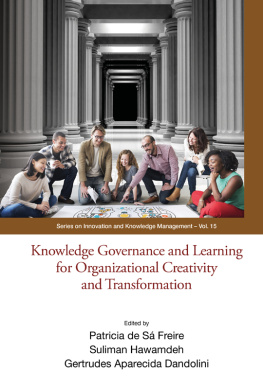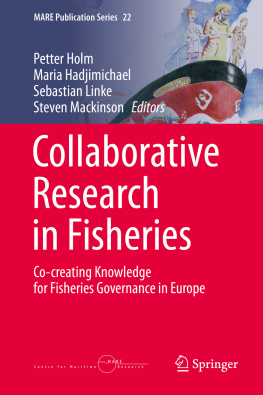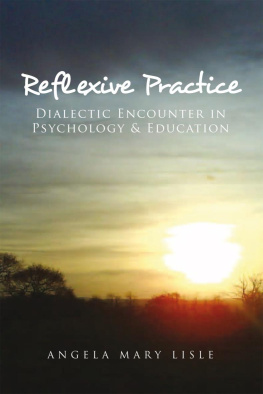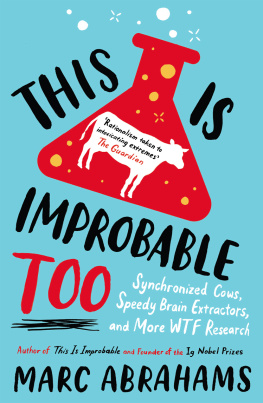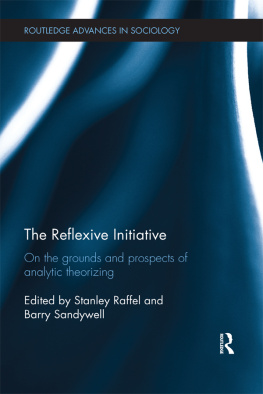Maesschalck Marc - Reflexive Governance for Research and Innovative Knowledge
Here you can read online Maesschalck Marc - Reflexive Governance for Research and Innovative Knowledge full text of the book (entire story) in english for free. Download pdf and epub, get meaning, cover and reviews about this ebook. City: London Hoboken;NJ, year: 2017, publisher: John Wiley & Sons, Incorporated;iSTE;Wiley, genre: Romance novel. Description of the work, (preface) as well as reviews are available. Best literature library LitArk.com created for fans of good reading and offers a wide selection of genres:
Romance novel
Science fiction
Adventure
Detective
Science
History
Home and family
Prose
Art
Politics
Computer
Non-fiction
Religion
Business
Children
Humor
Choose a favorite category and find really read worthwhile books. Enjoy immersion in the world of imagination, feel the emotions of the characters or learn something new for yourself, make an fascinating discovery.
- Book:Reflexive Governance for Research and Innovative Knowledge
- Author:
- Publisher:John Wiley & Sons, Incorporated;iSTE;Wiley
- Genre:
- Year:2017
- City:London Hoboken;NJ
- Rating:4 / 5
- Favourites:Add to favourites
- Your mark:
- 80
- 1
- 2
- 3
- 4
- 5
Reflexive Governance for Research and Innovative Knowledge: summary, description and annotation
We offer to read an annotation, description, summary or preface (depends on what the author of the book "Reflexive Governance for Research and Innovative Knowledge" wrote himself). If you haven't found the necessary information about the book — write in the comments, we will try to find it.
Reflexive Governance for Research and Innovative Knowledge — read online for free the complete book (whole text) full work
Below is the text of the book, divided by pages. System saving the place of the last page read, allows you to conveniently read the book "Reflexive Governance for Research and Innovative Knowledge" online for free, without having to search again every time where you left off. Put a bookmark, and you can go to the page where you finished reading at any time.
Font size:
Interval:
Bookmark:
- 2 The Origins of Governance Theory
- 3 Exploring Reflexive Governance Theory
- 4 Key Strengths of a Reflexive Theory of Governance
- 5 Promoting Reflexive Governance of RRI
- 6 Intellectual Intervention in Society: The Key to Reflexive Governance of RRI
- 2 The Origins of Governance Theory
- 3 Exploring Reflexive Governance Theory
- 5 Promoting Reflexive Governance of RRI
- 6 Intellectual Intervention in Society: The Key to Reflexive Governance of RRI

This book would not have come into existence without the unfailing support of Nicolas Cuneen, Oleg Bernaz and Ewa Stasiak (CPDR).
I would also like to thank Professor Bernard Reber for his continued trust and Professor Jacques Lenoble for his inspiring force.
Responsible Research and Innovation Set
coordinated by
Bernard Reber
Volume 6
Marc Maesschalck

First published 2017 in Great Britain and the United States by ISTE Ltd and John Wiley & Sons, Inc.
Apart from any fair dealing for the purposes of research or private study, or criticism or review, as permitted under the Copyright, Designs and Patents Act 1988, this publication may only be reproduced, stored or transmitted, in any form or by any means, with the prior permission in writing of the publishers, or in the case of reprographic reproduction in accordance with the terms and licenses issued by the CLA. Enquiries concerning reproduction outside these terms should be sent to the publishers at the undermentioned address:
ISTE Ltd
27-37 St Georges Road
London SW19 4EU
UK
www.iste.co.uk
John Wiley & Sons, Inc.
111 River Street
Hoboken, NJ 07030
USA
www.wiley.com
ISTE Ltd 2017
The rights of Marc Maesschalck to be identified as the author of this work have been asserted by him in accordance with the Copyright, Designs and Patents Act 1988.
Library of Congress Control Number: 2016961587
British Library Cataloguing-in-Publication Data
A CIP record for this book is available from the British Library
ISBN 978-1-84821-989-2
Volume 3 of the Responsible Research and Innovation Series (Volume 2 in French) From Ethical Review to Responsible Research and Innovation compares the various forms of ethics in research (integrity, protection of individuals and ethical review of projects to be financed) to the commitments of responsible research and innovation (RRI). Governance is an essential condition for the success of RRI. It contributes to a multiplication of perspectives that favor ethical deliberation. As one of the pillars of RRI, governance could enable a more active approach to ethical concerns, which are understood broadly as well beyond the individual ethics of researchers and engineers. Governance is tasked with regulating cooperation between actors with different identities, interests, care capacities and responsibilities. Their different backgrounds are also motivated by varying expansionary rationales that sometimes conflict with uncertain and contingent relationships to borrow an important term from the title of Volume 1, Ethics and Efficiency: Responsibility and Contingency. If RRI favors the inclusion of participating parties, interest groups or citizens in the processes of research and innovation, it must be concerned with governance to imagine accepting this inclusion, in line with various lists of international evaluation criteria.
The increased importance of governance is not only a consequence of globalization and the redistribution of tasks, and thus responsibilities, between state and private and public institutional actors. It is also at the center of the European integration. This space is a common site of experimentation with differing norms tested by crises and the solutions created in response. As early as 2001, governance was the subject of reports published by the European Commission. It highlighted new concerns associated with five principles: efficiency, consistency, participation, transparency and (the key element for RRI) sharing responsibilities. Thus, RRI is centrally tied to the entire European structure, not only in areas of innovation and research.
However, watchwords such as partnership and participation or even terms that were later associated with them, like transparency and responsiveness, strive for a concept of governance that goes well beyond mere regulation. Governance, as one of the pillars of RRI, can only be called ethical and thus truly responsible when closely associated with freedom recalling the title of Volume 2 in the series, Responsibility and Freedom. This is another path that this new volume takes, which is certainly not incompatible. It asserts that we must explain what we mean by different additions or qualifiers associated with governance. They can cover very different practical realities depending on the theoretical orientations assumed. It is not enough to thematize the old modes of government that we claim to have moved past. We must still be convinced that the new ways of governing really are new and that they measure up as a responsible governance for innovation and research. Marc Maesschalcks reflexive governance, which he identified after studying different models of governance over many years, is dynamic enough to accommodate this concern. In passing we will see that it is distinct from the project of meta-governance proposed by the European research project about RRI, ResAgora. The Belgian philosopher begins his work with an epigraph chosen from the work of the famous science philosopher Georges Canguilhem: to make use of data in the course of a pre-existing practice, that practice must be translated into conceptual terms; theory must guide practice, not the other way around. There is thus no place in this volume for an approach that would be satisfied with a too comfortable descriptivism. This all too common approach reduces governance to an emerging public practice rather than approaching it as a collective action coordinated by normative guidance. In fact, when the question of a new approach to ways of governing in the public interest is necessary, and must be accompanied by new methods of regulation, the question cannot be reduced to a change of hand in the center of authority or a simple balancing act between self-regulating subsystems. The author opens the black boxes of identity and the frameworks of action, both individual and collective, to elaborate a comprehensive and critical approach.
Reflexive governance is very ambitious. It is an experimental process that transforms the roles and forms of normative production. The innovative interpretation of norms comes to modify the behavior of the actors involved, individuals and institutions alike. This form of governance, when realized, is built on action understood as the meeting process of different interests and competing methods and knowledge in accordance with a collective process of inquiry that tends toward the resolution of problems. At the same time, this action process has effects on the participating parties as soon as the action is completed. Such a model avoids the privilege accorded to secure representations that are fixed with the identity of idealized agents. Another advantage is that this model of governance passes the test of transferability between different environments with spontaneous references particular to formative and enunciative spaces. This is important because it is a condition of mutual learning and appropriation. Envisaged in this way, governance can better resist risk of capture, counteraction or dissolution by innovative propositions.
Font size:
Interval:
Bookmark:
Similar books «Reflexive Governance for Research and Innovative Knowledge»
Look at similar books to Reflexive Governance for Research and Innovative Knowledge. We have selected literature similar in name and meaning in the hope of providing readers with more options to find new, interesting, not yet read works.
Discussion, reviews of the book Reflexive Governance for Research and Innovative Knowledge and just readers' own opinions. Leave your comments, write what you think about the work, its meaning or the main characters. Specify what exactly you liked and what you didn't like, and why you think so.

